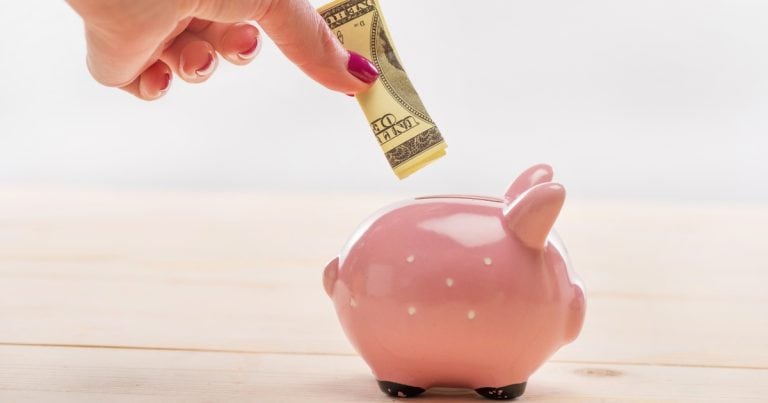14 Signs You May Be an Overspender: How to Take Control of Your Money
I make money on some of the products and services I mention on Thinking Frugal through affiliate relationships. I never endorse a product or service unless I believe it will benefit my readers.
We all have some months when it feels like there’s more month than money. But if you find that this is your regular routine, that may be one of many signs that you’re a chronic overspender. It can be really hard to admit, but if you find yourself constantly struggling with money, then there’s a good chance that you may have a spending problem.
A lot of people have a hard time saying no to themselves when it comes to spending money. But if you want to get your finances in order, it’s important to be aware of how much money you’re spending and where it’s going.
Overspending is a common problem, and it can be tough to overcome. However, it is possible. In this blog post, I’ll discuss 14 signs that you’re spending too much money. Once you know what they are, you can start taking steps to address the issue and take control of your money.
Make an Extra $100+ Per Month for Free:
Earnably: Earn gift cards or PayPal cash to watch videos, complete surveys, and more.
GrabPoints: Earn money watching videos, completing surveys, downloading apps, and more.
Ibotta: Get paid to shop.
InboxDollars: Get paid to watch videos, shop, complete surveys, and more.
InstaGC: Earn gift cards, or PayPal cash by watching videos, taking surveys, shopping, and more.
Swagbucks: Earn gift cards, or PayPal cash by watching videos, taking surveys, shopping, and more.

14 Signs You’re an Overspender
1) You Have no Budget and Don’t Track Spending
Instead of keeping track of what you’re spending, you’d rather just enjoy your purchase and worry about the consequences later. This can be a formula for disaster, as it’s all too easy to overspend and end up in debt.
When it comes down to budgeting, many people think that it means giving up on the things you love. However, that’s not true. Budgeting is not about restricting your spending or cutting out the fun stuff. It’s about keeping track of how you spend your money so you don’t overspend and you have room to save for the things you really want to do.
The first step in getting a handle on your overspending is to create a budget that works for you and stick to it.
2) You Pay Your Bills Late
One common sign that you may be spending more money than you can afford is if you frequently find yourself paying your bills late. This is because if you’re living paycheck to paycheck, there’s a good chance that you’re spending all of your money as soon as you get it – which means that you won’t have any left over to cover your bill payments.
If you find that you’re frequently paying your bills late, it’s important to take a step back and reassess your spending habits. Otherwise, you could find yourself in a downward spiral of debt. As a result, you may end up racking up late fees, which can further damage your financial situation.
One way to make sure you always pay your bills on time is to set up automatic payments. This way, you don’t have to remember to make a payment each month, and you can be assured that all of your bills will be paid on time.
3) You Overdraft Your Bank Accounts
Over drafting your account once in a while is not necessarily a cause for concern. However, if you find that you are regularly overdrawing your account, it may be a sign that you are an overspender.
When you overspend, you typically spend more money than you have available, which can lead to debt and financial problems down the road. If you find that you are constantly overdrawing your account, it may be time to take an immediate look at your spending habits and make some changes.
4) You Make Decent Money but You’re Always Broke
It’s a common scenario: you make decent money, but you’re always broke. You may not think this is a big deal, but it can actually be a sign that you’re an overspender. When you’re always broke, it means that your spending is consistently outpacing your income. This can lead you to financial problems down the road, so it’s important to be aware of your spending patterns.
If you’re concerned about your spending, it’s important to take steps to get control of your finances. Start by assessing your spending habits and see where you can cut back. Then, create a budget and stick to it. With some effort and discipline, you can get your spending under control and improve your financial situation.
5) Your Credit Score is Bad
A low credit score can be an indicator that you are an overspender and bad with money. This is because it shows that you have had trouble making payments on time in the past. A low credit score will also make it difficult to get a loan, rent an apartment, or get a job.
There are several simple things you can do to improve your credit score, such as paying your bills on time and using a credit monitoring service. However, if you have a low credit score, it is crucial to understand why it is important to improve your financial habits.
6) You Only Pay the Minimum on Your Credit Cards
Many people think that only paying the minimum on their credit cards is a good way to save money, but in reality, it can be a sign that you’re an overspender.
When you only make the minimum payment, you’re not really paying off your debt – you’re just paying the interest and fees. This means that you’re actually spending more money in the long run, even though it may not seem like it at first.
7) Shopping is Your Hobby
Shopping can be a fun pastime and a great way to relieve stress, but it can also be a sign that you’re an overspender. If you find yourself spending more than you can afford or using shopping as a way to make yourself feel better, it’s likely that you’re not good with money.
There’s nothing wrong with enjoying a shopping trip now and then, but if it’s causing problems in your life, it may be time to rethink your relationship with money. Otherwise, you could end up in serious financial trouble.
8) Your Credit Cards Are Maxed Out
One sign that you may be an overspender is if you frequently find yourself with maxed-out credit cards. This can be a warning sign that you’re living beyond your means and not keeping track of your spending.
If you’re consistently maxing out your credit cards, it’s time to take a step back and reassess your spending habits. Otherwise, you’ll just end up digging yourself deeper into debt.
9) You Have no Retirement Savings
When it comes to retirement savings, the sooner you start saving, the better. However, if you find yourself without any retirement savings, it may be a sign that you’re overspending. If you aren’t saving on a regular basis, it’s likely that you’re spending more money than you’re bringing in. In addition, retirement savings are often invested, so if you’re not saving for retirement, you’re missing out on potential earnings.
If you want to ensure that your financial future is secure, it’s important to start saving for retirement as soon as possible. Otherwise, you could find yourself fighting to make ends meet in retirement. Ultimately, having no retirement savings can be a sign that you’re bad with money and need to make a few changes to your spending habits.
10) You Buy Things You Don’t Use
Just because something is on sale doesn’t mean you need to buy it. In fact, if you’re constantly buying things you never use, it could be a sign that you’re overspending and bad with money.
If you find that you’re constantly buying things you never use, it might be time to reevaluate your spending habits. Are there specific triggers that make you spend more than you should? Once you identify these triggers, you can start working on breaking the overspending cycle. With a little bit of effort, you can get your finances back on track.
11) You Have More Debt Than Income
Anyone who has ever been in debt knows that it’s a scary feeling. This is because having more debt than income is a clear sign that you’re overspending and bad with money. Of course, a certain amount of debt is normal and even necessary. But when your debt starts to exceed your income, it’s time to take a severe look at your spending habits.
If you aren’t bringing in enough money to cover your debts, it means you’re spending more than you’re earning. And that’s a desperate situation to be in. Not only will it make it difficult to meet your financial obligations, but it can also lead to financial ruin.
So if you ever find yourself in this situation, it’s important to take action quickly. Make a budget and stick to it. Cut back on unnecessary expenses. And most importantly, try to increase your income.
12) You Lie About Your Shopping
When you lie about shopping trips, it’s a sign that you’re not good with money. You’re overspending, and you know it. Lying about it just makes it worse. It’s a downward spiral that can be tough to break out of.
If you’re constantly lying about your shopping trips, it’s time to take a step back and reassess your spending habits. There are a lot of really good resources available out there to help you get your spending under control. You don’t have to lie anymore. You can get a grip on your finances and make better choices for your future. It all starts with being honest about your spending. Give yourself a chance to break the cycle of lying and overspending. It’s time to take control of your finances and your life.
13) You Have No Emergency Savings
Having no emergency savings is a sign that you’re an overspender. Here’s why: if you’re constantly spending all of your money, then you’re never going to have any left over to put into savings. And if you don’t have any savings, then you’ll be more likely to rely on using credit cards or getting loans if something unexpected comes up. In other words, not having emergency savings can be a sign that you’re bad with money and are overspending.
So, if you are in this situation, try to cut back on your spending and build up your savings. You’ll be glad you did if something unexpected comes up.
14) You’re Constantly Borrowing Money
Constantly borrowing money can be a sign that you’re an overspender and bad with money. This is because when you’re constantly borrowing money, it means that you’re not able to save up and live within your means.
It’s important to be able to save up for things so that you don’t have to rely on borrowing money. If you’re constantly borrowing money, it might be a good idea to get some financial counseling so that you can learn how to better manage your money.
Final Thoughts
If you’re experiencing any of the above-mentioned signs, it may be time to seek help to get a grip on your finances. The best way to achieve this is by creating a budget, stopping unnecessary spending, and paying off debt. The sooner you take action, the better.







